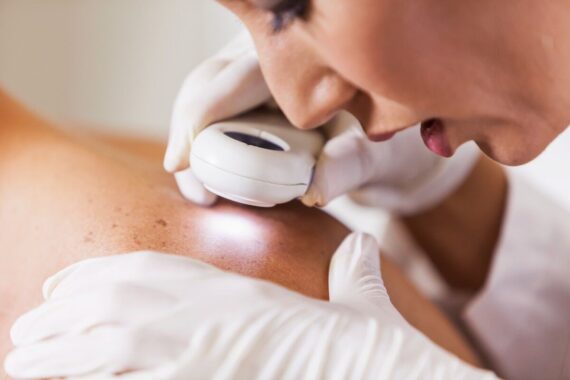Consultant dermatologist Dr Sue Ann Chan advises on how to navigate referral pathways for dermatological conditions
Advice and guidance
Advice and guidance (A&G) services offer a useful source of secondary care dermatology input for the management of skin conditions. They may confirm a diagnosis or suggest differential diagnoses, including for chronic conditions and acute eruptions, or offer advice on new lesions.
A&G can also be useful for long-term management of conditions such as atopic dermatitis, chronic plaque psoriasis and acne when standard management has failed. This route is also useful for advice on treatment options for patients who are waiting to be seen in secondary care.
As the guidance is based solely on information from the requesting GP, it must be of high quality. Images are useful, particularly with evolving lesions and rashes. They can either be taken in clinical practice or by the patient but they must be clear.
Occasionally, GPs may use the service for non-clinical questions, for instance, to check if treatment for a condition is funded in the NHS or what private options are available.
A&G should not be used for lesions that may be skin cancers such as melanomas or squamous cell carcinomas, or for pigmented lesions where dermoscopic examination is required. Using this route will cause unnecessary delay in conditions such as extensive psoriasis that may require phototherapy or systemic therapy, and in severe and unresponsive atopic dermatitis and severe acne vulgaris, where the patient will clearly require a face-to-face assessment.
Unless your trust provides a rapid-response A&G service, you should not refer emergency dermatological conditions via A&G. Some areas are streamlining dermatology referrals; in the West Midlands, this will involve a single point of access for all secondary care dermatology referrals and A&G, including paediatric and urgent two-week-wait referrals. The aim is to enable GPs to access a consultant dermatology opinion within 72 hours.
Emergency clinic referrals
The vast majority of patients with dermatological complaints can be triaged, stratified and managed urgently via the dermatology outpatient and emergency clinic.
Some will require same-day referral to the acute medical unit or via paediatrics, but there are no strict protocols with most of these conditions on which need urgent admission – we usually rely on the GP’s clinical judgment.
Conditions that can go through the emergency clinic route include:
- Erythroderma from an underlying chronic skin condition such as eczema or psoriasis, or a new erythrodermic episode. This will sometimes require same-day AMU admission – but not if the patient is systemically well and manages at home, for example.
- Steven-Johnson syndrome and toxic epidermal necrolysis (TEN) – this will usually require hospital admission.
- Serious drug eruptions.
- Infected eczema, eczema herpeticum or acute exacerbation of eczema (lower threshold for hospital admissions in children for management).
- Acute exacerbation of chronic plaque psoriasis affecting a large body surface area.
- Severe allergic contact dermatitis.
- Progressive blistering conditions.
- Rash in a patient with fever.
- Vasculitis.
- Severe angio-oedema and urticaria.
- Generalised pustules.
- Necrotising fasciitis – often admitted acutely.
- Unexplained worsening skin rashes.
If the nature of the skin eruptions is unclear or if there are diagnostic concerns, consider asking for advice from the dermatology on-call team.
Urgent two-week wait referrals
Patients should be referred via this route if there is a suspicion of malignant melanoma, squamous cell carcinoma or rare malignant skin cancers. In addition, basal cell carcinomas on high-risk sites including the ears, periorbital, nasal and perioral regions (known as the ‘H-zones’) may warrant an urgent two-week-wait hospital referral.
Other conditions that should be referred by this route include:
- Suspicious pigmented skin lesions or changing pigmented lesions.
- New keratotic nodules not resolving within two weeks.
- Non-healing skin ulcerations or skin lesions.
Routine referrals
Routine referrals are suitable for dermatological conditions where management in the community has been exhausted, or where patients are no longer responsive to community treatment. These are usually non life-threatening chronic skin conditions such as acne vulgaris, chronic dermatitis, psoriasis, folliculitis, hidradenitis suppurativa or alopecia requiring specialist input.
Patients may have to wait a prolonged period before being seen by secondary care. The A&G service can be used to obtain advice on intermediate management. It should not be used for escalation of referrals if a formal face-to-face referral has already been completed.
Dr Sue Ann Chan is a consultant dermatologist at City Hospital Birmingham
Pulse July survey
Take our July 2025 survey to potentially win £1.000 worth of tokens













